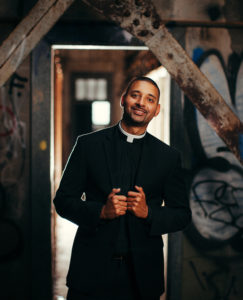Is there such a thing as “red flags” when it comes to discerning religious life? Fr. Josh responds to a listener’s question regarding best practices when discerning religious life. He shares advice on what to look out for and how to get to know different religious communities.
Snippet from the Show
As individuals, we are in constant need of reformation.
Shownotes
“
Glory Story (2:40)
Listener Question (4:37)
I am discerning religious life and I’ve heard some stories about it not working out for people. Some people I know have been hurt. No different than a dating relationship, but discerning a religious life is not as common as dating. I find myself in unfamiliar territory with not a lot to test a community and see if I want to “date” them. Can you give some red flag scenarios to look for both while getting to know a community and maybe something you might not really see until you enter.
-Anonymous
Saint Story: St. Teresa of Avila (22:33)
Teresa of Avila was born in 1515 in Avila, Spain. She was one of her father’s twelve children. The home she grew up in was very reverent and she learned the faith well. When Teresa was fourteen years old, her mother died. Around this time, she began to spend more time with cousins who had a bad influence on her. She became quite fanciful and invested in superficial things.
Seeing how his daughter changed, Teresa’s father sent her to live at a convent and be educated. After being there for a year and a half, she became very sick. She was eventually taken home where she recovered. She then began to ponder entering the religious life. Once she decided to enter, she asked for her father’s permission. However, he denied her and said she had to wait until he died.
Unwilling to wait, Teresa left and entered the Carmelite order. She prayed that her father would understand. A while after entering, Teresa once again fell ill. She was brought home to recover. While home, she helped her father to deepen his prayer life. It wasn’t until three years later that Teresa was able to return to the convent.
Once she returned to the convent and was able to pull herself away from the outer world, Teresa’s prayer and union with Christ became very poignant. As she worked to reform the Carmelite order, she faced a lot of obstacles and judgment. However, she persevered and was able to get the order back to its foundations and helped it to observe its Rule faithfully. She founded many more convents and wrote extensively.
St. Teresa of Avila is one of the four women Doctors of the Church.
Resources
- Submit your questions and feedback to Fr. Josh by filling out a form at www.ascensionpress.com/askfatherjosh
- Broken and Blessed by Fr. Josh Johnson
- Pocket Guide to Adoration by Fr. Josh Johnson
- Pocket Guide to Reconciliation by Fr. Josh Johnson & Fr. Mike Schmitz
- Ascension is pleased to offer our new and improved online bible study programs and sacramental preparation programs digitally to help you minister with flexibility. Go to ascensionpress.com to view all our offerings.
Meet Fr. Josh Johnson

While Fr. Josh was raised Catholic, he didn’t like the Church growing up. Then, one day in adoration, he fell in love with Jesus and received the call to become a priest.
Now, Fr. Josh is the Vocations Director of the Diocese of Baton Rouge in Louisiana. He is a presenter in four of Ascension’s programs: Altaration, YOU: Life, Love, and the Theology of the Body, The 99, and Connected: Catholic Social Teaching for This Generation, as well as the author of Broken and Blessed: An Invitation to My Generation, Pocket Guide to Adoration, and co-author of Pocket Guide to Reconciliation.





Before we can pray for and recommend different religious orders, or religious life AT ALL, there needs to be a discussion about the VERY REAL issues with the Formation Process, especially within the more ‘Traditional/Popular’ orders. There is much work and needed reform that needs to happen, right from the very top, and it is an issue that should be of great concern, particularly for the CMSWR. GenZ is a different animal than the previous generations, and what worked in the past is often no longer relevant. First of all their has to be an ADMISSION across the board that there is an issue in the first place, and then there has to be authentic, genuine DIALOG with the Major Superiors, the Formators, AND those who are discerning and those who have been dismissed from religious life, regardless of whose idea it was. Nobody wants to talk about attrition rates in our convents and the aftermath, and nobody wants to have an honest conversation about the fact that there is often spiritual and psychological abuse, and in some cases it’s bad enough to be labeled spiritual ASSAULT. The words ‘toxic’ and ‘religious life’ should NEVER be in the same sentence but that is the experience for some. There is often shame, anger, and hurt involved and many young women, after a negative experience have not only left religious life, but Catholicism! This must be addressed! It should not be virtually impossible to become a Bride of Christ, and the Formators need to take a hard look at who they decide does or doesn’t make the cut. One only has to read the many anecdotes from the Story of a Soul to see the tenderness that St. Therese bestowed on her novices! Too many Formators are projecting their OWN will on these young women to the point their voices and will is drowning out the Voice and Will of the Holy Spirit. This has been an on-going issue even as I type. It is not something that vanished post Vatican II.
I wholeheartedly agree. My Novice, Director of a well-known Community, was incredibly cruel to me. Years later the sisters, that were in the novitiate with me, said she was definitely trying to get me to leave. She had her favorites. Even my Junior (temp professed) Director had favorites. My private life, that I only spoke to her about, was well known among her favorite sisters. The sisters told me they knew all about my spiritual life and desire to become a cloistered Poor Clare. The Provincial Superior hated me with obvious disgust. I just couldn’t understand. She was the one who allowed me to enter.
Then when I had discerned leaving and joining the Poor Clare’s, these superiors outright called me a traitor to the entire community at dinner. I know because one of my dear friends was there.
I joined this previous community because of the joy exuded from their young sisters and what I believed was God’s call.
I would never have left, no matter what. I believe that suffering is a beautiful offering to our Lord and a way for me to grow.
This community of sisters, while having had a number of younger sisters as superiors, still has a number leaving and or going to Alma (most everyone who is a religious knows what Alma is.)
I cannot recommend this community to anyone. I said as much years ago on one of their YT videos and was told I had to take my comments down. I acquiesced because I tried to be the bigger person.
I was with the cloistered Poor Clare for six years until the council sent me home. I had intractable migraines. Honestly, they got me incredible medical help. This day and age, a religious lying sick in bed does not work in communities. It’s no longer the age of St. Thérèse or St. Elizabeth of the Trinity.
So deeply sorry for your experience. I just wish there was a solution. The way some orders handle formation, and the lack of professional training of the formators is not sustainable in the long run. Sure some orders may be bursting with vocations but convents shouldn’t be factories where the attrition rate is higher (and sometimes MUCH higher) than the young women who persevere. Why aren’t more people upset about this or talking about it? Why is it easy to talk about priest abuse but abuse in convents be it spiritual etc is taboo?